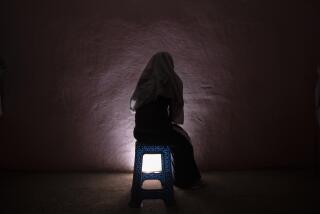Rape and Trauma Arise From a Deal Made in Hell
- Share via
When I was conducting interviews in Sierra Leone last month on a Physicians for Human Rights investigation, the one that I cannot forget is a conversation with a 16-year-old girl named Shirley. So injured from repeated rapes by the time she escaped her captors and returned home, she required a complete hysterectomy. When asked about a just punishment for the Revolutionary United Front, or RUF, rebels who enslaved her, who also had killed her parents before her eyes, she responded: “If I ask for punishment for them, it will never amount to what I went through, so the best thing is just to leave them so that we can have peace in Sierra Leone.”
“Just leave them” is precisely what a U.N.-brokered peace agreement, the 1999 peace accord, did. The accord provided blanket amnesty for all crimes committed in the nine-year civil war, giving top positions in a coalition government to RUF leader Foday Sankoh and his men. This was a price most Sierra Leoneans were willing to pay to end a civil war that visited extraordinary atrocities upon them.
It was a deal made in hell. Sankoh and his commanders refused to disarm their men, release their captives or relinquish control of Sierra Leone’s diamond mines, where an illegal but brisk trade in gems with Liberia and Burkina Faso assures the RUF a large supply of weapons in return. Worse, having paid no penalty for their monstrous crimes against unarmed men, women and children, rebel forces continue to terrorize, maim, kidnap, loot, kill and rape.
Especially rape. U.N. officials have estimated that Sierra Leone has the highest rate of sexual violence in the world. Although no one knows the numbers, it is safe to say that thousands of women and girls were raped and killed, or abducted and forced to live as sexual slaves. For example, Physicians for Human Rights received credible reports that in the areas north of Port Loko, Makeni and Kabala, the rebels raped nearly all the women and girls in the area of control. Some of these “rebel wives” have escaped, and those working with them report that the majority return malnourished and physically and emotionally traumatized. At least 60% are pregnant, and up to 90% contracted sexually transmitted infections, including HIV.
The 1999 accord and the establishment of a coalition government brought a temporary respite in some areas from the civil war, but even the presence of U.N. peacekeepers has not protected civilians where the RUF still dominates. Human Rights Watch recently reported that in a two-month period this year, RUF forces committed hundreds of atrocities in the Port Loko area--a stone’s throw from U.N. peacekeepers’ checkpoints.
As a Sierra Leonean returning to Freetown for the first time in five years, I was stunned by the level of trauma experienced at every level of society that transcends religions, tribal affiliations, geographic regions, age, gender, occupation, education and socioeconomic levels. But if war has destroyed the lives of the civilian population, it has been good to the RUF and the former army of Sierra Leone, whose soldiers simply take what they want, whether it be a village’s women and girls, or Sierra Leone’s diamond mines.
The RUF now has turned its guns against the international community. The world’s response will mean life or death for Sierra Leonean civilians who are as much the RUF’s hostages as are the U.N.’s 500 soldiers and staff.
Now that the RUF has nullified the peace agreement and there is no peace to keep, Physicians for Human Rights believes that the U.N.’s new mandate must be peacemaking not peacekeeping. To do this, the international community should first respond immediately to the U.N. Secretariat’s request for a rapid reaction force to free the U.N. hostages. That force must also ensure protection for all civilians, including those with RUF forces in the bush, used in the past as human shields. Protecting demobilization sites, camps of internally displaced people and other communities particularly vulnerable to RUF reprisals should be the immediate priority.
If forces from West African nations are themselves prepared to conduct such peacemaking operations, they should be logistically supported, carefully monitored and held to the highest standards of military professionalism by the international community. Also, the U.N. Security Council should swiftly establish an international commission of inquiry and a tribunal to prosecute war crimes in Sierra Leone, including rape. What hangs in the balance is not only the lives of Sierra Leone’s already beleaguered civilian population. What is especially at stake is the future viability and credibility of U.N. peacekeeping operations. The U.N. was put to shame in Rwanda in 1994. Let it not happen again.
More to Read
Sign up for Essential California
The most important California stories and recommendations in your inbox every morning.
You may occasionally receive promotional content from the Los Angeles Times.













